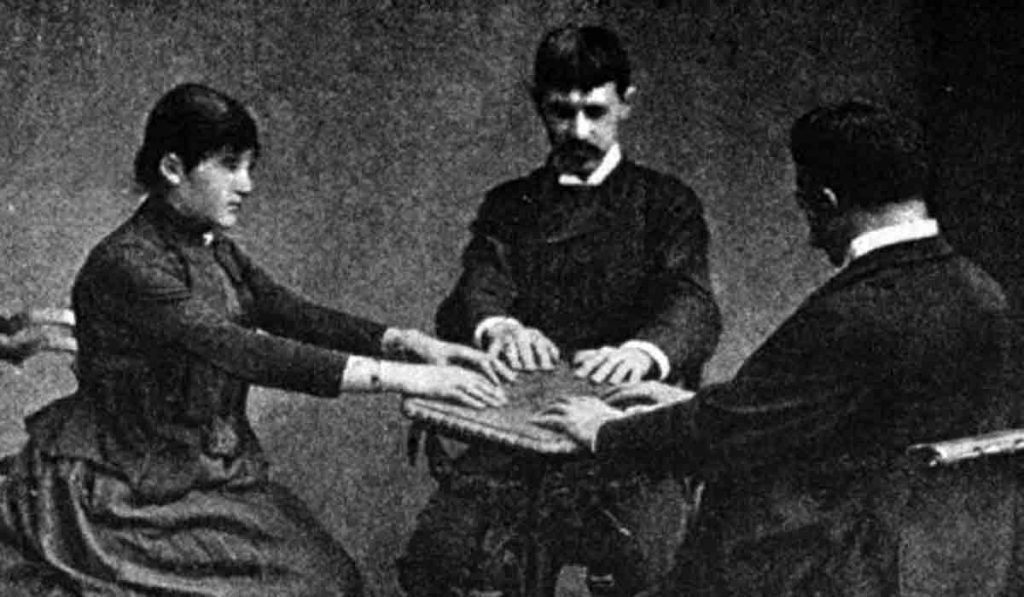Was Susan Willis Fletcher, convicted and imprisoned in 1880 for spiritualist fraud, a con artist or a misunderstood true believer? ANDREW GARVEY looks at what the courts and the papers said, and at Fletcher’s own, very different, account.

A short piece in the Nottingham Evening Post of December 1st 1880 recorded that “Susan Willis, or Fletcher, a lady-like person was apprehended last night… on a charge of fraud by spiritualism and was remitted to the Scotland Yard authorities. Her husband is ‘wanted’ on a similar charge but remains in America.”
The Trial of Susan Willis Fletcher Begins
Released on bail, Fletcher appeared before London’s Bow Street magistrates three weeks later. According to the Sheffield Daily Telegraph, the couple’s victim, Juliet Ann Theodore Henrietta Hart Davis had been duped into handing over her a significant quantity of very valuable jewellery on the advice (via the Fletchers) of her late mother.
Initially, a sickly Mrs. Hart Davis had in May 1879 called in John William Fletcher “having been known as a galvanist.” By the way, for a fascinating account of galvanism as a popular pre-Victorian health craze and early twentieth century ‘science’, have a look at chapter two of Frank Swain’s excellent pop-science book ‘How to Make a Zombie’.
Sister Bertie and the Jewels
It was Mr. Fletcher who first, in a trance, made contact with Mrs. Hart Davis’ mother. After a few sessions, he introduced her to his wife. According to the Sheffield Daily Telegraph report:
“Mrs. Fletcher also went into trances, and delivered messages from her mother, one of which was that she should not wear her jewellery so much as the magnetism of her mother was strong in them and did injury.
Her mother advised her to pass a suite of amethysts and diamonds, consisting of necklace, pendant, and earrings to her newly adopted sister. She was further advised by her mother to hand over all her jewels to ‘Sister Bertie’, which was the pet name of Mrs. Fletcher, to wear as if they were her own.
On a subsequent occasion… she laid the jewels down on a little table [and] it moved from one end of the room till it stopped where the defendant was sitting. Knocks were heard all over the room. Mrs. Fletcher said, ‘What do you want, dear spirit?’ and the answer given was that it wanted to communicate by writing.
There was no paper in the room, and Mr. Fletcher brought some. Mrs. Fletcher took the pencil, and her arm being controlled by the spirit of witness’ mother, she wrote, ‘Dear Juliet, do as you are instructed.’ Witness thought she had not been ready enough in rendering up the jewels, and was in a terrible fear.”
The Verdict
This approval to wear up to £4000 worth of jewels (over £300,000 today) eventually became, once another of the Fletchers’ associates got involved and drew up the papers, a ‘deed of gift’ and eventually a will that would bequeath the jewellery and other valuables worth a total of some £6,000 (or £10,000 in some newspapers), to them on Mrs. Hart Davis’ eventual demise.
At the trial’s end, Justice Hawkins summed up the case. Running to (by some accounts) five-and-a-half hours, Hawkins’ speech saw him direct the jury to dismiss some of the charges, particularly the ones related to ‘witchcraft, sorcery and enchantment’ and focus on the ones relating to the alleged fraud.
Needing a mere ninety minutes or so to deliberate, the jury delivered a guilty verdict on three charges and Susan Willis Fletcher was sentenced to twelve months’ imprisonment.
Susan Willis Fletcher’s Story
In 1883, firmly back on American soil, Fletcher published her story, ‘Twelve Months in an English Prison’, a largely indignant five hundred page account of her life, trial and imprisonment. Robustly telling her side of the story, and painting a less than pleasant portrait of Mrs. Hart Davis, she strongly defends her beliefs and behaviour and protests long and hard that she was wrongfully convicted.
Fletcher, who seems to have picked up contacts from the other side like commuters attract ‘charity muggers’ in major train stations and big city centres even details her spiritual encounters in prison, as well as recounting some experiences with, and her defence of, other tricks of the Victorian spiritualist/medium’s trade like spirit writing and the sudden manifestation of solid objects in locked rooms.







